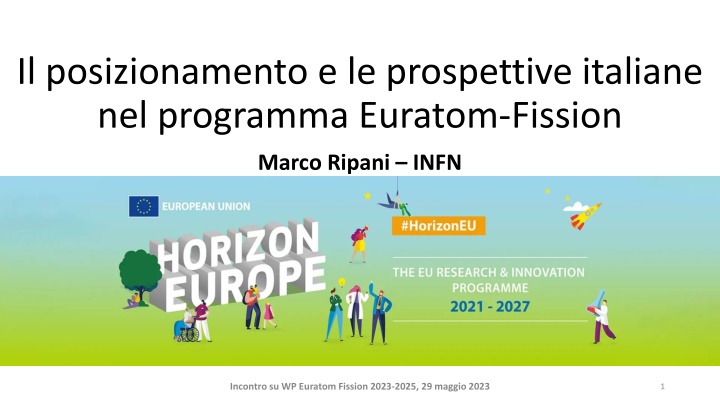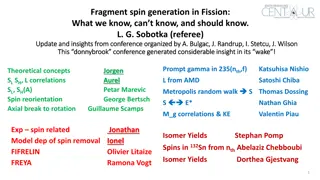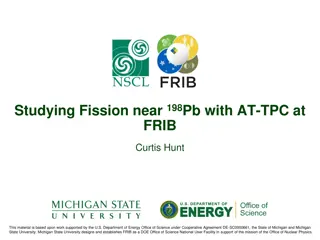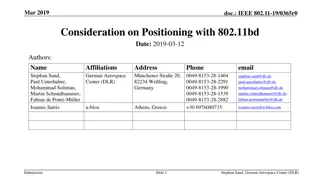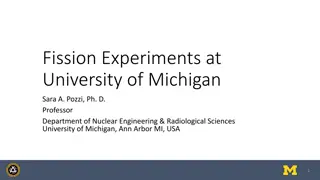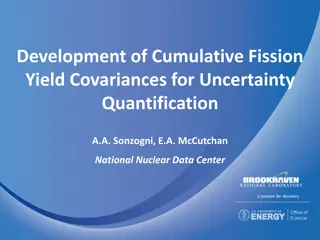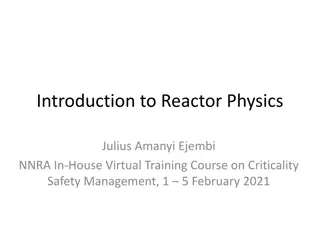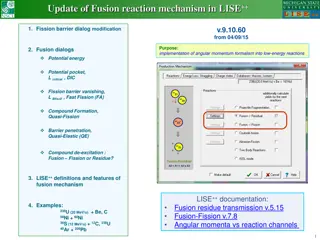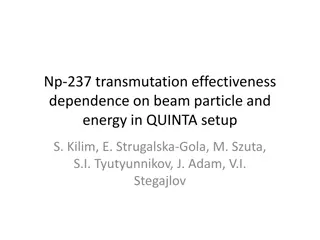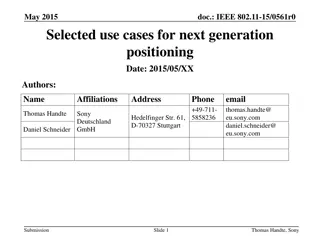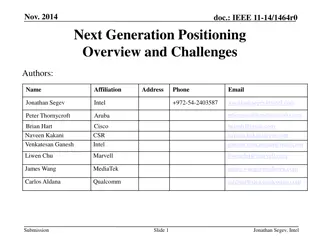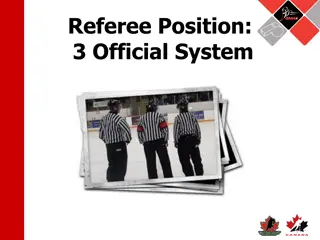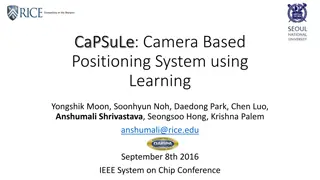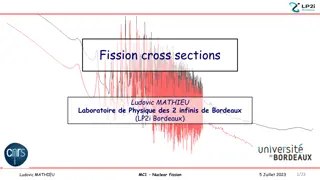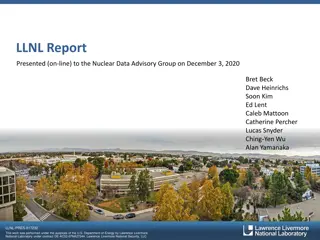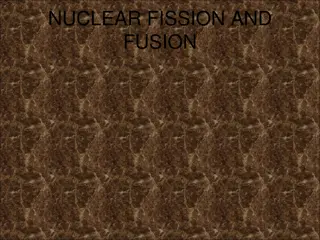Italian Positioning and Perspectives in the Euratom-Fission Program
Exploring the Italian participation and achievements in the Euratom-Fission program, focusing on safety, advanced nuclear designs, tritium management, waste disposal, and radiation protection. Key themes include nuclear safety, waste management, radiation applications, and non-call actions. The Horizon-Euratom-2023-NRT-01-01 initiative emphasizes enhancing the safety and resilience of nuclear plants. Italian entities have been actively engaged in various projects to advance nuclear technologies and address emerging challenges.
Download Presentation

Please find below an Image/Link to download the presentation.
The content on the website is provided AS IS for your information and personal use only. It may not be sold, licensed, or shared on other websites without obtaining consent from the author.If you encounter any issues during the download, it is possible that the publisher has removed the file from their server.
You are allowed to download the files provided on this website for personal or commercial use, subject to the condition that they are used lawfully. All files are the property of their respective owners.
The content on the website is provided AS IS for your information and personal use only. It may not be sold, licensed, or shared on other websites without obtaining consent from the author.
E N D
Presentation Transcript
Il posizionamento e le prospettive italiane nel programma Euratom-Fission Marco Ripani INFN Incontrosu WP Euratom Fission 2023-2025, 29 maggio 2023 1
I risultati Italiani nel WP 2021-2022 Participazione di entit italiane in molti progetti sulle seguenti tematiche: Safety of operating nuclear power plants and research reactors (con 1 progetto a coordinamento italiano) Safety of advanced and innovative nuclear designs and fuels Advanced structural materials for nuclear applications Harmonisation of licensing procedures, codes and standards for future fission and fusion plants Development of tritium management in fusion and fission facilities Towards a harmonised application of the international regulatory framework in waste management and decommissioning European Partnership for research in radiation protection and detection of ionising radiation (nuovo Partenariato cofinanziato partito nel 2022): Progetto PIANOFORTE Safe use and reliable supply of medical radionuclides Cross-sectoral synergies and new applications of nuclear technologies Towards a European nuclear competence area Socio-economic issues related to nuclear technologies Support for Euratom national contact point Incontro su WP Euratom Fission 2023-2025, 29 maggio 2023 2
Le parole chiave e le novit proposte nel nuovo WP Aree tematiche 1. Nuclear Safety 2. Safe spent fuel and radioactive waste management, decommissioning 3. Nuclear science and ionising radiation applications, radiation protection, and emergency preparedness 4. Other actions not subject to calls for proposals Incontro su WP Euratom Fission 2023-2025, 29 maggio 2023 3
Nuclear safety HORIZON-EURATOM-2023-NRT-01-01: Safety of operating nuclear power plants and research reactors Challenges related to ageing management and/or the evaluation of safety margins of the reactors fleet. Development of methods and tools to increase safety, the availability of systems, structures and components needed for reliable and safe management, core physics and thermal hydraulics, monitoring, digital including artificial intelligence, internet of things and digital twins, modelling and simulation, as well as prevention and mitigation strategies for long-term operation. Adequate safety margins, early detection of degradation and prevention of failures in pressure boundary components is of high priority Importance of research activities to ensure proper analysis of damage tolerance, degradation, loads and safety margins, and to ensure appropriate programmes for inspections, repairs and the replacement of components Incontro su WP Euratom Fission 2023-2025, 29 maggio 2023 4
Nuclear safety (segue) HORIZON-EURATOM-2023-NRT-01-02: Safety of light water small modular reactors (LW-SMRs) Safety aspects on integration of LW-SMRs in the hybrid energy system, including the evaluation of optimal electric grid management and safety by design. Some LW-SMR safety specificities such as: core/fuel (includingfuel qualification); nuclear steam supply system integratedvessel and its internals; demonstration of natural circulation passive safety systems also in transientconditions; streamlined harmonised licensing; severe accident analysis; emergency preparedness and response; human and environmental radiationprotection; safety, security and safeguardinterfaces from the early design stage; modularity, human factors and hybridisation/(co)generation of heat/H2 production/desalination. Minimisation of and management options for radioactive waste arising from LW-SMRs link with EURAD-2 partnership Development of methods and tools to increase safety, the availability of systems, structures and components needed for reliable and safe operation, core physics and thermal hydraulics, radiation protection specificities, monitoring, artificial intelligence, digital twins, modelling or simulation, and probabilistic safety assessment, including multi-unit effects. Incontro su WP Euratom Fission 2023-2025, 29 maggio 2023 5
Nuclear safety (segue) HORIZON-EURATOM-2023-NRT-01-03: Safety of advanced and innovative nuclear designs Further research and innovation is needed to demonstrate the safety of advanced systems that offer increased sustainability, new non-electricity applications and flexibility in terms of adaptation to the energy mix with intermittent/variable sources. These advanced reactor technologies could also be deployed as small modular reactors, combining their specific properties and advanced coolant technologies. Research proposals should: Keep the focus on safety by design, aiming at achieving a scientific consensus to ease the understanding and appropriation by the regulators of any innovative reactor concepts and their associated fuel cycles. Cover the viability phase of advanced technologies, when basic concepts are tested under relevant conditions. For example, proof of concept of better safety features, confirmation of safety improvements during the performance phase when engineering-scale processes are verified and optimised under prototypical conditions, and the demonstration phase when detailed design is completed and licensing is carried out. Further investigate safety aspects of selected advanced reactor systems and the use of non-water coolants and fluid fuel designs, higher operational temperatures also related to the option of industrial process heat production and H2 generation and higher reactor power density in order to assess their potential, proliferation resistance, radioactive waste management (waste minimisation by design , decommissioning by design ), emergency management and response, human and environmental impact, safeguards, social perception and their effects on the long-term sustainability of fuel cycles. On waste aspects link with the EURAD-2 partnership. Further investigate safety aspects of operational flexibility in an integrated energy system, for example by design and safety demonstration of intermediate heat storage facilities or other means. Incontro su WP Euratom Fission 2023-2025, 29 maggio 2023 6
Nuclear safety (segue) HORIZON-EURATOM-2023-NRT-01-04: Co-funded European partnership for research in nuclear materials Impacts: 1. Structured consolidation of the European research community on nuclear materials. 2. Contribute to maintaining the high level of safety of nuclear installations for current and future fleets, in full compliance with relevant European regulations. 3. Develop scientific knowledge and technological expertise applicable to the nuclear materials domain, including the coordinated use of infrastructures for materials qualification with sustainable quality assurance, and the production of reliable nuclear databases that meet FAIR principles. 4. Improved interaction of the nuclear materials research community with European nuclear regulatory bodies and their technical support organisations. 5. Improved exchange of knowledge across the respective research communities, including for example fusion and non-nuclear energy generating technologies. 6. Improved quality of education and training of nuclear materials specialists, achieved in a coordinated manner across the EU in collaboration with existing nuclear education networks. Incontro su WP Euratom Fission 2023-2025, 29 maggio 2023 7
Nuclear safety (segue) HORIZON-EURATOM-2023-NRT-01-05: Partitioning and transmutation of minor actinides towards industrial applications Strengthen important Euratom research undertaken in previous programmes and make real advances towards demonstration of P&T processes Although R&D on advanced fuel cycle technologies has been carried out for decades, there is consensus within the international community that a complete programme is needed with the aim of (i) industrial maturity to demonstrate the feasibility of a closed fuel cycle; (ii) minimisation of high- level radioactive waste; and (iii) increased safety. Further efforts are needed among other things in the following areas: separation technologies; fuel fabrication; transmutation systems; fuel reprocessing; fuel technological aspects (particularly for MA-loaded fuels), including transportation, cooling and handling. Developing advanced experiments, digital and High Performance Computing numerical simulation tools, taking full advantage of existing knowledge, competence and expertise and international cooperation should be highly beneficial. On the radioactive waste management aspects link with the EURAD-2 partnership. Incontro su WP Euratom Fission 2023-2025, 29 maggio 2023 8
Nuclear safety (segue) HORIZON-EURATOM-2023-NRT-01-06: Improved nuclear data for the safety of energy and non-energy applications of ionising radiation Proposals should: Demonstrate how state-of-the-art simulation, experimental and multidisciplinary approaches will be used to produce nuclear data libraries, capitalising on previous Euratom projects and on the international expert community. Build upon new nuclear data measurements using innovative instrumentation and detectors, reactor and accelerator-based neutron sources, improved evaluation, validation and modelling in order to achieve the required accuracies to better assess uncertainties and correlations in their evaluation. Demonstrate that proposed activities will be applied to the demonstration facilities in the energy and non-energy fields, for example innovative design improvements, implementation of advanced fuel cycles, innovative light water reactors and small modular reactors, accident tolerant fuels, optimisation of radioactive waste management and geological disposal, production and use of radioisotopes (e.g. high precision nuclear data, for the major actinides present in advanced reactor fuels, to reduce uncertainties on isotopes with new relevance for applications; closing fuel cycles with minimisation of radioactive waste). Provide tangible contributions in the field of evaluated nuclear data, their testing and validation; develop and validate computer tools in the nuclear data pipeline; contribute to the Joint Evaluated Fission and Fusion (JEFF) evaluated nuclear data file and its production, and as such strengthen Euratom s nuclear simulation capacities to support the identified High Priority Request List (HPRL) of the international evaluation cooperation working parties that monitor priority nuclear data needs for nuclear applications, e.g. OECD Nuclear Energy Agency Working Party on International Nuclear Data Evaluation Cooperation, JEFF and the International Atomic Energy Agency. Incontro su WP Euratom Fission 2023-2025, 29 maggio 2023 9
Safe spent fuel and radioactive waste management, decommissioning HORIZON-EURATOM-2023-NRT-01-07: Innovative technologies for safety and excellence in decommissioning, including robotics and artificial intelligence As identified in the Euratom project portfolio and the SHARE project, a roadmap for research and innovation in decommissioning has been published based on the needs and gaps identified across the whole decommissioning value chain and built on the input of the international stakeholder community,. The thematic areas that should be prioritised are in situ waste characterisation and segregation, robotics and remote systems, difficult to measure radionuclides, clearance of surfaces and structures, cost estimation and knowledge management. In particular, specific needs include developing remote, integrated and automatic technologies for waste characterisation and segregation, but also modular and mobile systems and robotic solutions to address the hard-to-access areas in a new and cost-effective way and developing data collection protocols and a global cost estimation methodology. Establishing guidelines and sharing best practices on the implementation of digital technologies like Building Information Modelling, digital twins and artificial intelligence is also expected to improve key decommissioning tasks. International cooperation will result in a relative harmonisation of decommissioning waste management systems, including its packaging, transport and storage. Harmonisation of clearance criteria for radioactive materials from decommissioning will also improve recycling in and out of the nuclear sector. As a result, it should build regulators trust in introducing innovative and modern techniques by boosting safety and efficiency and improving the evaluation of safety margins and licensing procedures. Incontro su WP Euratom Fission 2023-2025, 29 maggio 2023 10
Nuclear science and ionising radiation applications, radiation protection, and emergency preparedness HORIZON-EURATOM-2023-NRT-01-08: Safety of low enriched fuel for research reactors - securing the supply of medical radioisotopes Euratom research will be driven by further development and qualification work by European HPRR and MPRR operators to enable their research reactors to be converted from highly enriched uranium to low-enriched uranium, and/or to ensure the supply of alternative fuels, including reactor-specific prototype demonstrations. Challenges relate among others to innovative manufacturing technologies for nuclear components and metallic nuclear fuel using HALEU, specifically in the domain of monolithic UMo-based fuel production in the EU as the highest density HALEU fuel possible to improve uranium economy in the conversion of current research reactors and the design of future research reactors, without excluding other alloys and metals. To secure the supply of HALEU, it is necessary to carry out R&D on the metallisation of low-enriched uranium by alternative methods to provide options to potential future EU manufacturers of HALEU. Advanced post-irradiation examinations and thermal conductivity measurements to support the qualification of high-density fuels and reactor-specific licensing are also necessary. Action should improve HPRR and MPRR operational safety and serve for state-of-art licensing procedures by developing, verifying and validating advanced modelling and simulation tools in relation to neutronics, thermal hydraulics and the mechanical stability of reactor cores using codes developed in Europe, e.g. SERPENT 2, but also by introducing digital technologies and artificial intelligence to reactor design. As a result, the action should increase regulators trust in introducing modern quality assured techniques into the licensing procedures of nuclear facilities and the evaluation of reactor safety margins. Incontro su WP Euratom Fission 2023-2025, 29 maggio 2023 11
Nuclear science and ionising radiation applications, radiation protection, and emergency preparedness ( segue) HORIZON-EURATOM-2023-NRT-01-09: Nuclear and radiation techniques for EU strategic autonomy, circular economy and climate change policies Applications of charged particle beams (accelerators), x-rays, radioisotopes (alpha, beta and gamma emitters) and neutrons. For example, radiometric techniques and radioisotopes as tracers allow for monitoring climate change effects on ecosystems and soil, water and air pollution. Help diversify the supply of secondary critical raw materials from non-EU countries and within Europe. Action in this area should develop EU capacity for innovative exploration and production of secondary raw materials and/or recovery/recycling of raw materials from spent nuclear fuel, e.g. rare-earth metals (lanthanides). Modify existing quality assured nuclear techniques and develop new ones to provide complementary solutions for conventional climate adaptation and climate science technologies. These solutions should help build EU resilience and reduce EU vulnerabilities in land use and management, smart climate agriculture, food production systems, analysis of greenhouse gas emissions, management of water resources, and ocean and coastal protection. On pollution, actions could cover sorting challenges, waste treatment and transformation into secondary products, cleaner production and recycling processes, reducing the use of potentially harmful additives and solvents and delivering energy savings. All potential solutions using nuclear techniques are expected to: Improve radiation protection of personnel, expertise in radiation protection, safety and security of radioactive sources, waste management, and reduce contamination risk, loss or theft. Be combined with newly emerging technologies such as artificial intelligence, big data or metamaterials Aim at open innovation , involving a broad range of actors from research and academic communities, industry, entrepreneurs and users. It should bring together multidisciplinary teams to generate ideas and solutions in an open innovation environment by increasing investment and bringing more companies and regions into the knowledge economy. Provide valid data from experiments This action could focus on closer-to-the-market activities, including prototyping, testing, demonstrating, piloting and scaling up new or improved products, processes or services, focusing on Technology Readiness Levels 5 to 7 Incontro su WP Euratom Fission 2023-2025, 29 maggio 2023 12
Nuclear science and ionising radiation applications, radiation protection, and emergency preparedness ( segue) HORIZON-EURATOM-2023-NRT-01-10: Harnessing innovation in nuclear science, technology and radiation protection This action aims to bring innovation, including via cross-fertilisation with other scientific and technical sectors, to radiation protection. This complements the PIANOFORTE European partnership in medical applications and emergency preparedness, alternative applications of nuclear energy, and risk communication with civil society and decision-makers. The purpose of this action is to complement the PIANOFORTE partnership by fostering frontier research and testing novel ideas that can bring about a breakthrough innovation in the field. Nuclear technologies could provide solutions that enable energy-intensive industries to develop and reduce their environmental footprint while remaining competitive. Nuclear has the potential to supply heat to homes, businesses and industrial processes, and produce hydrogen and synthetic fuels or non-electric commodities such as purified water or fertilisers. The Euratom-funded action should address the safety challenges related to developing and implementing non-electric applications for nuclear energy. The Euratom-funded action should address the development of new quality assured nuclear techniques or optimisation of existing ones in the medical field. This includes data processing methodologies using artificial intelligence, optimisation of the medical use of ionising radiation and corresponding optimisation of radiation protection. The EU supply of novel radiopharmaceuticals for cancer therapy is at risk due to the growing uncertainties over imports of enriched stable isotopes from Russia. Ensuring European know-how and the EU s strategic capabilities in this field is essential for the decades to come. Bring about and test novel ideas for risk communication to ensure informed decisions by stakeholders, civil society and decision-makers. Incontro su WP Euratom Fission 2023-2025, 29 maggio 2023 13
Nuclear science and ionising radiation applications, radiation protection, and emergency preparedness ( segue) HORIZON-EURATOM-2023-NRT-01-11: Preparatory phase for a European production capability to secure a supply of high-assay low-enriched uranium (HALEU) fuel This action should provide catalytic and leveraging support for a preparatory phase aiming at bringing the project to a level of maturity required to potentially enable construction work to start on the EU s production capability. It should therefore cover all relevant outstanding issues in strategic planning, technical work, financial arrangements and financing mechanisms, project logistics and legal aspects. The preparatory phase should aim at optimal coordination, cross-border operation and possible integration of national research actions of trans-European interest in the field. This might lead to the possible setting up or reinforcement of legal entities to achieve optimal cooperation and joint programming. The preparatory phase should aim to bring the initiatives emerging today in different fields to the level of managerial, legal and financial maturity required to implement them. Project consortia should involve all the stakeholders necessary to move the project forward, take decisions and make financial commitments before joint programmes can start (e.g. national or regional ministries or governments, research councils, funding agencies). Operators of research facilities, research centres, universities, industry and regulatory authorities should be involved where appropriate. During these activities, the Commission will act as a facilitator. Incontro su WP Euratom Fission 2023-2025, 29 maggio 2023 14
Other actions not subject to calls for proposals Co-funded European partnership on radioactive waste management The partnership results are expected to contribute to all of the following outcomes, linked to the impacts described above: 1. Deliver science and technology-based, socially robust solutions for the safe management of spent fuel and radioactive waste in Europe, building among other things on the lessons learned during the safe implementation of the first geological disposal facilities as well as improving, innovating and developing science and technology for the management and disposal of other radioactive waste categories. 2. Share and develop best practices and methodologies in all matters related to radioactive waste management from generation to disposal improve operational excellence and minimise operational, dismantling and induced secondary waste. 3. Improve the safe management of radioactive waste from generation to final disposal In particular, this would help evaluate the potential impacts of advanced fuel types and deployment of innovative types of reactors on waste management strategies. 4. Develop elements for a strategy for predisposal operations (including treatment solutions and interim storage) and the disposal of challenging radioactive waste streams. 5. Establish an inclusive collaborative framework that feeds and keeps up to date the EURAD roadmap 6. Consolidate knowledge transfer between Member States and across generations by providing a platform and network for training, mobility and available facilities in radioactive waste management .Furthermore, a thorough reflection should be launched on creating, at European level, a sustainable network of labs that could be used by all European partners in support of their programme needs. 7. Promote public debate and interactions with civil society to increase public confidence in the national radioactive waste management programmes by encouraging transparency, credibility and scientific excellence 8. L Italia partner di MICADO, SHARE, PREDIS, CLEANDEM, INNO4GRAPH (FP8), HARPERS (FP9, WP 2021-2022) e pu dare un significativo contributo a EURAD-2 Incontro su WP Euratom Fission 2023-2025, 29 maggio 2023 15
Ma non dimentichiamo Nuclear Innovation Prize 2025 Nuclear Innovation Prize in safety of reactor systems Nuclear Innovation Prize in safety of radioactive waste management Nuclear Innovation Prize in radiation protection Primo premio 50 k , secondo premio 30 k , terzo premio 20 k MSCA Postdoctoral Fellowships in research fields covered by the Euratom Programme 2021-2025: https://marie-sklodowska-curie-actions.ec.europa.eu/news/opening-of-postdoctoral-fellowships-2023-call Scadenza 13 settembre Incontro su WP Euratom Fission 2023-2025, 29 maggio 2023 16
Grazie ! Incontro su WP Euratom Fission 2023-2025, 29 maggio 2023 17
